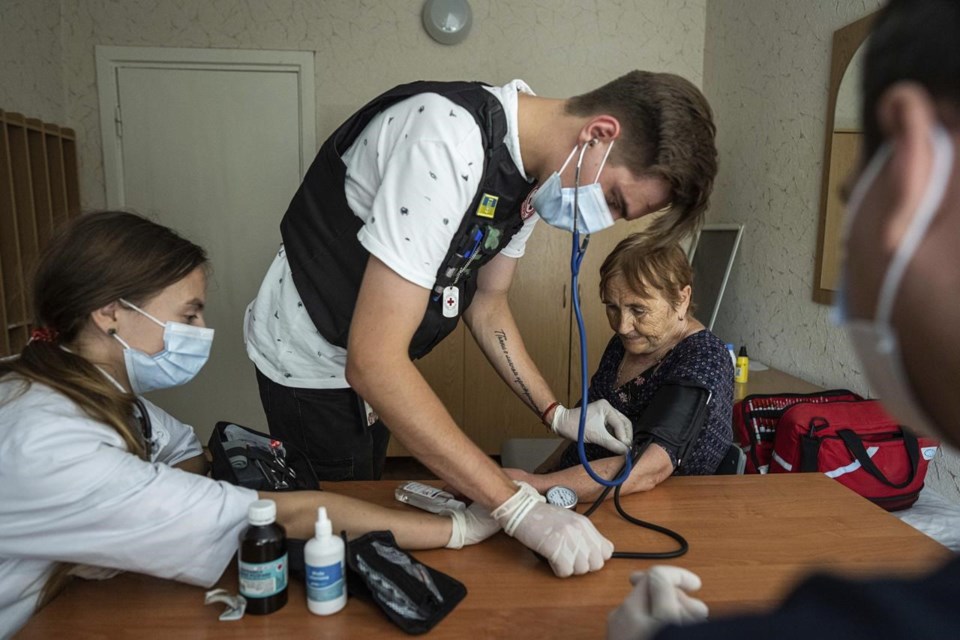ZOLOCHIV, Ukraine (AP) — Dr. Ilona Butova almost looks out of place in her neatly pressed lavender scrubs as she walks through a door frame that hangs from a crumbled wall into what used to be an administrative office of her hospital in Zolochiv.
Not one building in the facility in the northeastern Ukrainian town near the Russian border has escaped getting hit by artillery shells.
Since Russia's invasion on Feb. 24, space to treat patients at the hospital has shrunk constantly because of damage. Her staff has dwindled to 47 from 120. And the number of people seeking treatment in the small town 18 kilometers (11 miles) from the border is often higher now than before the fighting began.
Ukraine’s health care system struggled for years because of corruption, mismanagement and the COVID-19 pandemic. But the war has only made things worse, with facilities damaged or destroyed, medical staff relocating to safer places and many drugs unavailable or in short supply. Care is being provided in the hardest-hit areas by doctors who have refused to evacuate or have rushed in as volunteers, putting themselves at great risk.
“It’s very hard, but people need us. We have to stay and help,” said Butova, a neurologist who also is the administrator of the hospital in the town near Kharkiv, Ukraine's second-largest city. She added that she has had to do more with fewer resources.
The World Health Organization declared its highest level of emergency in Ukraine the day after the invasion, coordinating a major relief effort there and in neighboring countries whose medical systems also are under strain.
About 6.4 million people have fled to other European countries, and a slightly higher number are internally displaced, according to U.N. estimates. That presents a major challenge to a health care system built on family doctor referrals and regionally separate administrations.
Across Ukraine, 900 hospitals have been damaged and another 123 have been destroyed, said Health Minister Viktor Liashko, noting: “Those 123 are gone, and we’re having to find new sites to build replacements.”
In addition, scores of pharmacies and ambulances have been destroyed or are seriously damaged, and at least 18 civilian medical staff have been killed and 59 others seriously wounded, he said.
“In occupied areas, the referral system has totally broken down,” Liashko told The Associated Press. “People’s health and their lives are in danger.”
Kyiv's economy was drained by the conflict with Moscow-backed separatists in eastern Ukraine that began in 2014. When he came to power five years later, President Volodymyr Zelenskyy inherited a health care system that was undermined by reforms launched under his predecessor that had slashed government subsidies and closed many small-town hospitals. During the pandemic, people in those communities had to seek care in large cities — sometimes waiting as long as eight hours for an ambulance in severe cases of COVID-19.
As Russia has expanded the territory it controls in eastern and southern Ukraine, the supply of drugs in those areas has dwindled, along with medical staff to administer them. In the southern front-line town of Mykolaiv, “things have been very difficult,” volunteer Andrii Skorokhod said.
“Pharmacies have not been working, and shortages have become increasingly acute: Hospital staff were among those evacuated, including specialists. We just need more staff,” said Skorokhod, who heads a Red Cross initiative to provide residents with free medications.
Volunteers like Skorokhod saved the life of 79-year-old Vanda Banderovska, whose home near Mykolaiv was destroyed by Russian artillery. Her 53-year-old son, Roman, was killed, and she was brought to the hospital badly bruised and barely conscious.
“My son went out to the car to get his mobile phone when the Russians started shelling. He was hit in the head,” she said at a recovery ward, her voice trembling with emotion. “They’ve destroyed everything and I have nothing left.”
Banderovska said she was deeply grateful to the people who saved her life but also overcome by grief and anger.
“The pain I feel is so great. When doctors took me to the hospital I was bruised black and blue but I slowly recovered,” she said.
___
Derek Gatopoulos reported from Kyiv. Vasilisa Stepanenko and Hanna Arhirova contributed to this report from Kyiv.
___
Follow AP's coverage of the war in Ukraine at https://apnews.com/hub/russia-ukraine
Mstyslav Chernov And Derek Gatopoulos, The Associated Press


